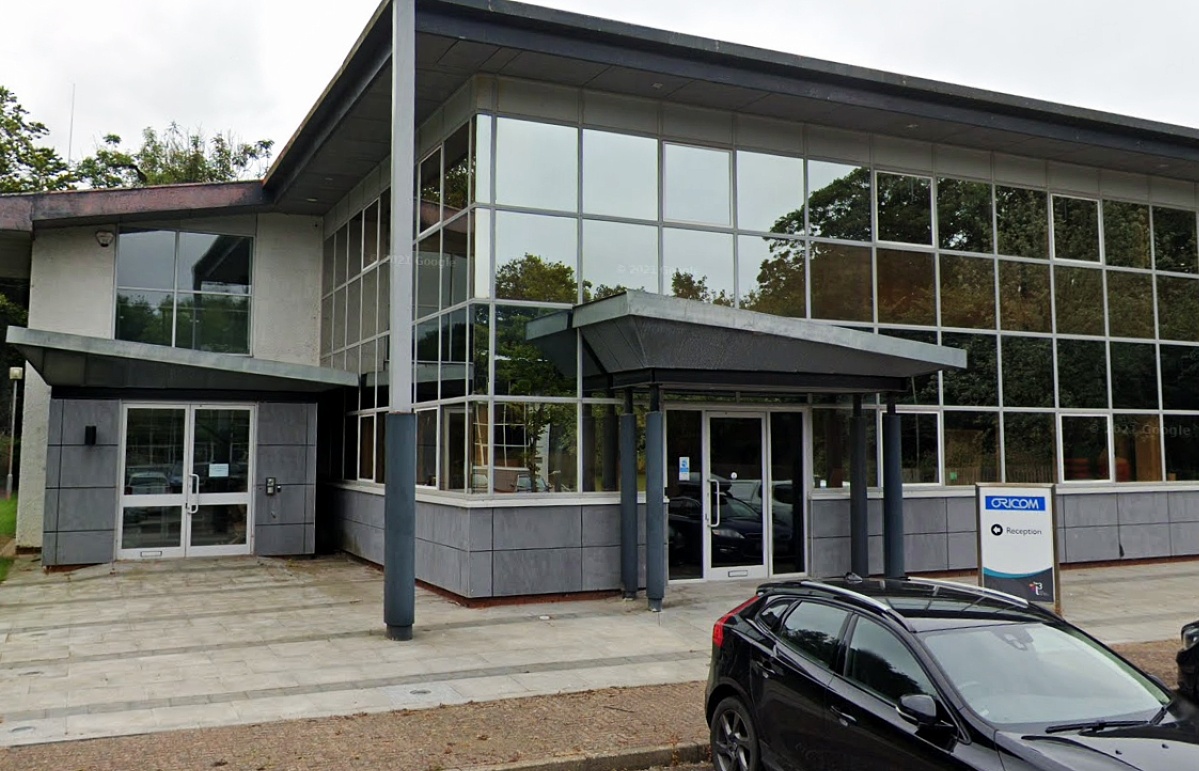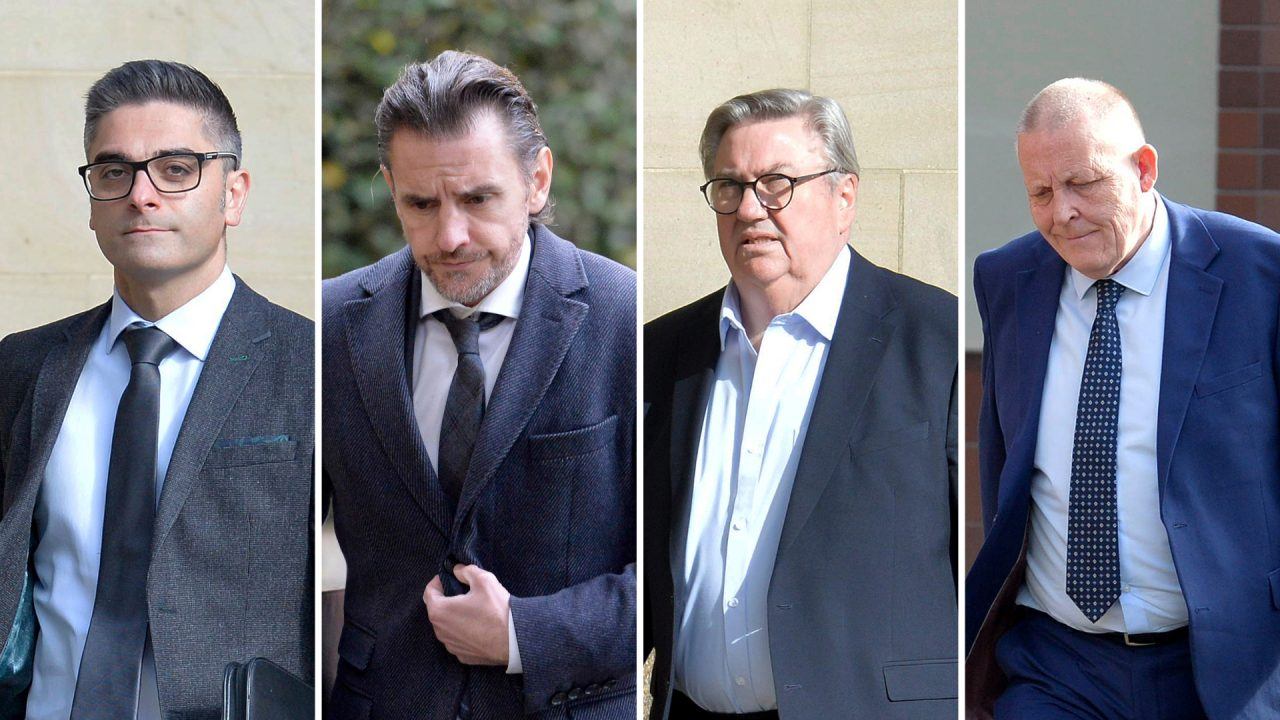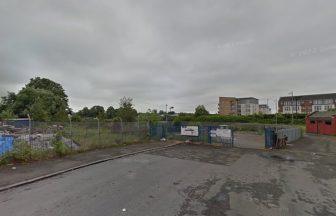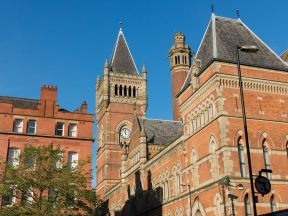Four men have been convicted in a £6m corruption and bribery probe at health boards across Scotland.
The group was charged following investigations into the award of lucrative NHS contracts to an Ayrshire–based telecommunications firm.
Adam Sharoudi, 41, and Gavin Brown, 48, ran Oricom Ltd, a firm that started from a garden shed and went on to secured major deals.
However, prosecutors said the contracts for the supply and maintenance of telecoms and video conferencing equipment broke the rules regarding financial wrongdoing in the tendering process.
 Google Maps
Google MapsThe Oricom bosses were illegally aided by Alan Hush, 68, and 60-year-old Gavin Cox.
Hush was the telecommunications manager at NHS Lothian and then NHS Scotland’s video conferencing manager.
Cox held the post of head of IT and infrastructure at NHS Lanarkshire.
The pair abused their powers as “public servants” to push deals through.
One contract alone was worth £3.1m.
In return, Hush got £18,231 of cash bungs and gifts, Cox a total of more than £70,000.
All four men denied the accusations during a three-month trial at the High Court in Glasgow.
But on Tuesday, jurors – after more than eight days of deliberations – found them guilty and they each face lengthy sentences when they return to the dock next month.
Corruption was ‘cancer in public and commercial life’
The charges spanning between 2010 and 2017 included bribery, corruption, fraud, theft as well as others under the Proceeds of Crime Act.
One stated Sharoudi and Brown did “acquire, use and possess” a total of £5,719,244 of “criminal property” paid by NHS Lothian, NHS Grampian, NHS Lanarkshire, NHS Greater Glasgow and Clyde as well as NHS Ayrshire and Arran.
The four had been on bail throughout the case, but were remanded in custody by judge Lord Arthurson.
He told them corruption was a “cancer in public and commercial life” and said the four men should expect “significant” jail-terms.
Oricom was formed in 2008 by trained engineer Brown and colleague David Bailey.
They later set up at offices in Irvine in Ayrshire. Sharoudi went on to join the team also as a director.
From starting as a small business, Oricom took on more staff and began to build a reputation in the telecoms industry.
Brown told jurors he believed they “could provide a better service” than some of the well-known companies.
This eventually led Oricom getting a number of big health board contracts.
But, in 2015, its offices were raided – including by investigators from NHS Scotland Counter Fraud Services – following concerns into how the deals were secured.
It resulted in the Oricom directors as well as Hush and Cox being arrested and charged.
Bailey was also prosecuted, but charges were dropped against him early in the trial.
‘Bank of Oricom’
The four accused all gave evidence in the case which sat for 65 days.
Hush, of Leith, Edinburgh, was first. He told jurors he initially became aware of Oricom in around 2010.
Hush ended up friends with Sharoudi, but denied there was any intimate relationship.
The trial heard of numerous text messages between the men throughout the years.
These included Hush referring to Sharoudi as “hunk” and him being called him “stud” in return. Hush also declared his love for the Oricom director.
Hush claimed messages would often involve “bawdy humour”.
He denied being dependent on Sharoudi for cash.
But, Hush was said to have complained at one stage: “I am keen to get some commission under my belt. I am going on holiday in a month and cannot afford a pot to p*** in”.
His KC Keith Stewart put to him during the trial: “If it is suggested any reference to commission was you talking about earning money from Oricom in exchange for contracts, what would you say?”
Hush replied: “That was not the case at all.”
He added any remark about “commission” was a joke.
In court, Hush claimed any payments he ever received had been money from his now late father.
He said: “He gave me cheques and cash. He was an old guy and had a box in his wardrobe stuffed with £20 notes.”
But, it was later suggested Hush had used the firm as the “Bank of Oricom” for his help in getting them business including a £750,000 contract with NHS Lothian.
The handouts were said to include train tickets, such as on the Eurostar, stays at the Troy and Re Hotels in London, a near £2,000 laptop, an iPad, meals as well as concert tickets to see Paul Simon, Rufus Wainwright and Patti Smith.
In cross-examination, prosecutor David Nicolson KC put to Hush at one stage: “At NHS Lothian, Alan Hush was the kingpin in the telecoms department.
“You were the ‘big cheese’, ‘the big boss’. The telecoms department was your fiefdom.
“Alan Hush played by the Alan Hush rules. Alan Hush made up the rules and did what he liked.”
He replied: “Alan Hush performed to the best of his abilities.”
Mr Nicolson also stated Hush had “failed to instigate a proper tendering process” for work Oricom secured.
Hush was said to have “ferreted about” in a “deception” to obtain false “dodgy” quotes to help the firm get the lucrative business.
Denying any wrongdoing, Hush insisted: “I have stepped into the witness box and told the truth.”
Sharoudi, of Motherwell, Lanarkshire, told his KC Brian McConnachie that Hush repaid for anything Oricom had purchased for him.
He said: “Alan was very cost-conscious. He paid back every single thing that was bought.”
The trial heard of a message Sharoudi wrote stating: “Spending Valentine’s Day with Hushie.”
But, Sharoudi told the court he just happened to be with Hush on February 14. He refuted claims there was anything intimate between them adding the NHS official could be guilty of “pushing a joke too far”.
‘A remarkable coincidence’
In his evidence, Cox, of Cathcart, Glasgow, denied being “bribed” by Oricom and that any contract with NHS Lanarkshire was won “fair and square”.
He was accused of giving Oricom the “heads up” with information to give them a “commercial advantage” to secure business.
It was suggested it was “not a level playing field” for other bidders.
Cox stated he was not “adamant” Oricom had to get the work, insisting it had to be done “through the proper tendering process”.
The court heard of an excited message exchange after the firm learned they were likely to be awarded one contract.
Cox’s “rewards” had been said to include hospitality at the Scottish Grand National at Ayr, a night at the Loch Green Hotel in Troon and a slap-up meal at Elliots in Prestwick.
Brown was also a guest at Cox’s surprise 50th birthday party.
The NHS official told the trial: “The things I got from Oricom I paid for fully.”
Jurors heard he also got thousands of pounds worth of Barrhead Travel holiday vouchers which allowed him to go on trips to New York and Lanzarote.
But, Cox said he believed they were gifts to his wife – a newspaper advertising manager – from Brown’s partner whom she had become friends with.
Prosecutors stated this was “a remarkable coincidence”.
Cox also denied ever getting a series of cash handouts from Oricom.
He told the trial he was instead given an inheritance – a holdall full of cash – following the passing of his father.
He returned from Northern Ireland and stuck it in his loft back home in Scotland.
Cox claimed it was only later that he realised how much was there – a total of £79,300.
It was around 2012 or 2013 when Cox claimed he and his wife agreed to “invest” it in the home they had moved into in Newton Mearns, East Renfrewshire.
Cox said: “We decided that we would improve the house with an extension. All of it came from my inheritance.”
Brown, of Prestwick, Ayrshire, told his KC Tony Graham he was happy at the work Oricom provided for the health boards over the years.
He added: “We did deliver a service. If they phoned at 3am, we would fix whatever they were on about. We had a good reputation. We worked really, really hard.”
Jurors heard Oricom even sorted a major wi-fi issue at Hairmyres Hospital in East Kilbride – ran by NHS Lanarkshire – during the course of the trial.
Brown also knew another NHS Lanarkshire telecoms official called Alexander “Sandy” Stewart.
Among the charges was that Oricom also effectively bribed him to secure work, including a near £700,000 deal.
Stewart has since died.
Prosecutors said further smaller “inducements” were given to an IT official who worked at both NHS Lanarkshire and Greater Glasgow and Clyde health boards as well as a woman with NHS Ayrshire and Arran.
Hush was found guilty of nine charges, Cox two, Sharoudi, seven and Brown a total of six.
Lawyers for all four had asked for them to remain on bail.
But, remanding them, Lord Arthurson went on to state: “You have been convicted by the jury of an extremely grave catalogue of offences.
“These include offences relating to bribery and corruption and charges brought under the Proceeds of Crime Act.
“You, Hush and Sharoudi, also multiple charges of fraud. By the verdicts, the jury has determined that you collectively engaged, to varying degrees, in a deeply cynical, highly corrupt, coldly calculated and criminal betrayal of the welfare state and, ultimately, the taxpayer.
“The court regards corruption as a cancer in public and commercial life.
“You should expect nothing less than the imposition of significant custodial sentences.”
Sentencing is due to take place on June 5 in Edinburgh.
They also face separate hearings under the Proceeds of Crime Act.
Prosecutors have also moved for Sharoudi and Brown to be banned as company directors.
Verdict welcomed by NHS Scotland
Gordon Young, head of NHS counter fraud services at NHS National Services Scotland, said: “We welcome the verdict at the High Court in Glasgow today.
“This case highlights the important role that NHS Counter Fraud Services (CFS) plays in NHS Scotland and the challenges we, and other public sector organisations, are facing to tackle fraud and corruption.
“Our investigation – which led to this case – highlights the commitment CFS has to rooting out fraud and we will continue to do everything in our power to prevent fraud to protect our vital NHS Scotland services and ensure our funding goes where it is needed – to patient care.
“It’s estimated that between 0.5% and 5% of government spending is lost to fraud and error each year and for NHS Scotland just 1% could mean it loses £195m which could pay for more than 6,000 Band 5 nurses.
“Our work also helps to ensure the future integrity of the health services procurement process, giving assurance that the public purse is protected from anyone considering abusing their position of trust.”
Follow STV News on WhatsApp
Scan the QR code on your mobile device for all the latest news from around the country



























